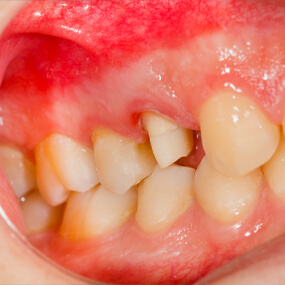Common Signs You Need a Wisdom Tooth Taken Out

Wisdom tooth extraction is among the most common dental procedures. The American Public Health Association estimates that Americans have 10 million wisdom teeth removed and spend $3 billion annually! The popular opinion is that that third molars are a vestigial human feature, but not all dentists agree. Whether you should have your wisdom teeth removed depends on a number of factors.
No Need to Remove Healthy Third Molars
Most dentists agree that there is no need to remove wisdom teeth when there is enough room for them and the teeth are healthy and straight. When examining your wisdom teeth, your dentist will assess whether you can reach them to clean them and whether they affect your bite or other teeth.
Preemptive Extraction
There are various reasons your dentist may recommend extracting a wisdom tooth as a precautionary measure. In some cases, a third molar is healthy but has not erupted within an expected period, and in other cases, the dentist can identify problems, such as there not being enough space available.
A dentist may even recommend extraction because a wisdom tooth has or will come in on an angle and thus be difficult to clean. If you have issues with gum disease or cavities, your dentist may recommend extraction proactively, and dentists tend to be more proactive with younger patients since bone hardens as you get older, which can make extraction more challenging and more uncomfortable.
Necessary Extraction
Many dentists advise waiting and watching until an issue manifests or it becomes clear that a problem will occur. In some cases, the issue with the wisdom tooth has already manifested, or the indication of the problem came on suddenly. Some common examples include:
- Cavities and gum disease – Many people have difficulty cleaning their third molars well enough. This can lead to inflammation of the surrounding gum tissue as well as cavities on the tooth itself. At this point, even if the cavity is minor and even reversible, your dentist may recommend extraction to avoid problems in the future.
- Alignment issues – If you had dental work performed prior to a wisdom tooth erupting, it is possible that the tooth can affect or even undo that work unless it is perfectly straight. This is, for instance, common in young people who wore braces or aligners prior to their third molars coming in. In such a case, your dentist will likely recommend extraction in order to preserve the previous correction, and, in fact, alignment issues are the most common reason that dentists extract wisdom teeth that are otherwise healthy.
- Damage to proximate teeth – Even prior to a wisdom tooth erupting, an X-ray can show that it is pushing against neighboring teeth. In this scenario, it is usually imperative to extract the molar. Allowing the molar to erupt could shift your other teeth, lead to discomfort, cause problems with your bite, and make tooth decay more likely.
- Jaw cysts – Dentigerous cysts are the most common growths affecting the jaw, and they originate from the tissue that surrounds a tooth prior to it erupting. These cysts are most often associated with molars. Third molars, in particular, often do not erupt or only erupt partially, which causes the cyst to form.
- Sinus problems – There are numerous problems with wisdom teeth that can put pressure on your sinuses. This can lead to sinus congestion and pain, and more often than not, extraction is the best option in such cases.
A Complex Decision: Seek Your Dentist’s Input
The modern dentist is less quick to pull wisdom teeth than dentists of the past. It can be a complex decision affected by many factors that are unique to your mouth and oral health. Your dentist will perform a thorough examination, including X-rays, review your oral health over the years, consult with you, and make a recommendation. If extraction is advised, your dentist will explain why, discuss the benefits, and answer any questions that you may have. In the end, the decision is yours, but it is highly recommended that you heed the advice of your dentist.
Visit a Dentist to Have Your Wisdom Teeth Assessed
If you have wisdom teeth that have not yet erupted or are experiencing other problems with your third molars, then you should schedule a consultation with a dentist as soon as possible. Jeffrey D. Clark, DDS, is a leading Scottsdale dentist who can examine your wisdom teeth within the context of your oral health history and help you make the decision to extract or not. Schedule your appointment with Dr. Clark today by calling Scottsdale Cosmetic Dentistry Excellence at 480 585 1853.




